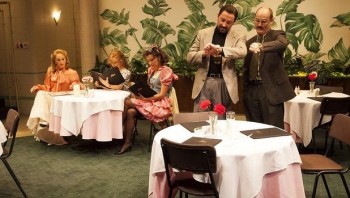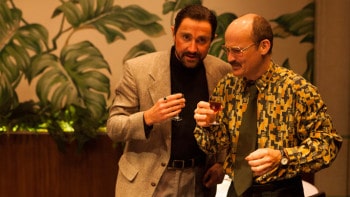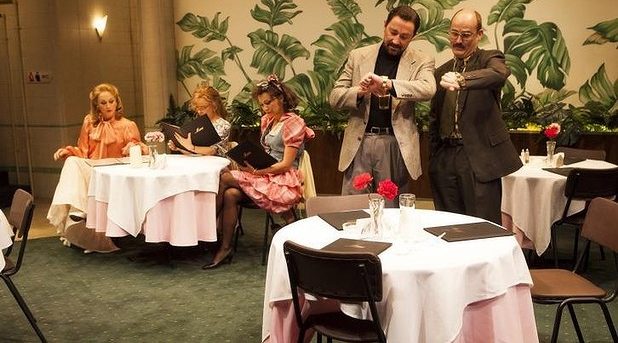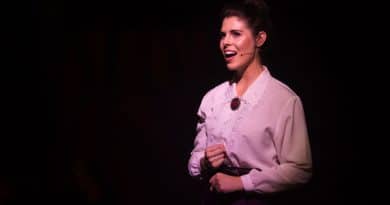Review: After Dinner, Sydney Theatre Co
Andrew Bovell wrote After Dinner when he was 21 years old, and that’s the most surprising thing about seeing the Imara Savage-helmed production at Sydney Theatre Company’s home at the Wharf. It is so surprising that for an early play written at such a young age, Bovell has managed to craft a cast of characters that are full of hilarious pathos, but are also startlingly insightful; even at 21, Bovell understand that mass of insecurity and want and need that makes a person, and how to present it as glorious, even when totally unhinged.

It’s a girls’ night out for Dympie (Rebecca Massey) and Paula (Anita Hegh) like they do every week: they meet at a lovingly eighties bar that just feels like a comfortable boring reliable RSL (fantastic design by Alicia Clements). They’re work friends, not friends that met at work, which is an important distinction to make. Tonight they’ve invited Monika (Helen Thomson), even though they’re not sure if they like her. It’s just that her husband has just died and she needs to get out more, and Paula is kind-hearted, and Dympie feels in control at the bar in these nights, so why not bring along one more?
Across the tables, and doing a great extended silent comic sequence, is a lone man, Gordon (Glenn Hazeldine). He fiddles with his napkin, painstakingly sketches with spilled salt, fidgets, and steals glances at the women. Eventually he’s joined by Stephen (Josh McConville), who is bullish where Gordon is ineffectual; he’s out to drink and meet women, and Gordon better get on board.
The laughs are constant and come from that sticky place within where you recognise your own unpolished flaws and failings and embarrassments within the characters, but they also come from very sophisticated, emotive writing. Monika has this monologue about her adventures from one side of the bar to the other and it builds to a hilarious, spellbinding conclusion, and it’s in this moment, with this routine, that Helen Thomson steals the show. She’s a comic force to be reckoned with, because there aren’t many people who could lift the character of Monika to such sublime, identifiable, lovable heights.

Also fantastic is Rebecca Massey’s Dympie, the lonely, somewhat disliked office lady who wants to both be in control and copy her more stylish friends; she’s looking for some sense of righteousness and of belonging, looking for real bonds, but of course she goes about this all the wrong way indeed. Massey brings her humanity to the fore, however, and Dympie becomes entirely sympathetic.
The cast, under Savage’s brisk, kind direction, bounce well against each other. Paula’s sweetness and youthfulness is evident in the bright-eyed Hegh, which helps takes the edge of sleaze from McConville’s Stephen and provides a lovely counterpart for Hazeldine’s gentle Gordon.
What a great way to start the year, with an excellently performed, tightly directed, fully realised slice of the eighties, and the perpetual dance of human interaction and feeling. What a fun, fun night at the theatre.




